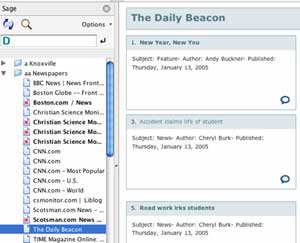|

|
Monday, January 17, 2005
|
|
| |
Jay Rosen at NYU has been writing smartly about this issue for more than a year
and will be involved in one more discussion of it at Harvard's
Blogging, Journalism & Credibility conference this week.
"Bloggers vs. journalists is over"
is his headline for a draft of what is shaping up to be an excellent
agenda-setting essay, with a cascade of comments and questions coming in from his weblog readers.
"We have to ask different questions now because events have moved the
story forward," Rosen said. I took his request for comments
as an excuse to catalog some of my own questions instead of offering answers. But maybe that's the point.
Whether bloggers can "do journalism" has always been a silly
question. Of course they can -- and sometimes some of them do, whether
you count "original reporting," "fact-checking," "whistle-blowing" or
"editorial comment" as journalism.
Other questions I hope get talked about at Harvard (and elsewhere, including my own classes at UT):
- Do the people know journalists when they see them? Should
reporters be issued hats with "Press" in the hatband? In one context or
another, I keep pointing to David T. Z. Mindich's scary anecdote about a college student referring to David Letterman as a "journalist."
- Do folks make fine distinctions between categories like
"entertainers," "commentators and pundits," "flacks and promoters,"
"trade press hacks," "newspaper hacks," "freelance hacks" and
"respected journalists"? (I use "hack" to mean something like "good
enough to get paid, at least part of the time.")
- Do they have different expectations along a scale from
"incompetent" and "mediocre" through "uneven" to "good," "trustworthy"
or even "Pulitzer-quality" practitioners?
- Do they view the past year's screw-ups by 60-Minutes, USA Today and
the New York Times as screw-ups, evidence of a system-wide problem, or
both?
- Are media conglomerates giving editors and broadcast news directors freedom to set their
own public-interest news department agendas? ("Conversation instead of lecture" is one possible agenda -- with
agenda-setting and trust-building as its goals. Self-righteous
crusading and simply being a "newspaper of record" are others.)
- What does it mean when CNN feels a need to put a disclaimer like
this -- "The WB, Warner Books and DC Comics are sister Time Warner
companies to CNN.com" -- on the bottom of a Web story about a TV series' writer who also writes novels and comic books? Do viewers take that to mean CNN is running the story because of those connections, or in spite of them?
- If the bottom-line and entertainment news are the main thing to
the conglomerates, what happens to the public-affairs function of
journalism in a democracy? As UNC's Phil Meyer
has asked, can public institutions or non-profit foundations support
the more resource-intensive, social-service, watchdog functions of the
press? Will some profit-making new-media model inherit the job?
For now, advertiser-supported, incestuous "big media" continues to
do part of the watchdogging, but has to be watched in turn... by
dueling media critics, an alphabet soup of professional associations (SPJ, RTNDA, IRE) and independent citizens, blogging and otherwise.
6:16:59 PM 
|
|
 The Daily Beacon, the
University of Tennessee student newspaper, has added an RSS feed as part of a site redesign...
just in time for a semester in which I'm assigning the Beacon to
students as a daily reading assignment. (For info about RSS feeds and
the programs that receive them, see the left-column links on
this weblog's front page, especially this one.) The Daily Beacon, the
University of Tennessee student newspaper, has added an RSS feed as part of a site redesign...
just in time for a semester in which I'm assigning the Beacon to
students as a daily reading assignment. (For info about RSS feeds and
the programs that receive them, see the left-column links on
this weblog's front page, especially this one.)
Unfortunately, the Beacon's RSS feed doesn't include stories or
summaries -- just each headline, the date and the story author's
name.
That puts an extra burden on the headline writers to make the reader
click through for
the details. I think "Accident claims life of student" does the job.
"New year,
new you" hints at just another "resolutions" story. "Road work irks
students" might work -- but is that story about the university's
constant exploration of portable-ditch technology, or about training
for a boxing career? (Neither, actually. It's about off-campus highway
construction.)
The image at the right shows what the Beacon's RSS feed looks like in
one of my aggregators, the Sage plug-in for Firefox. I'm subscribed to
the feeds listed in the picture's left column; the right column and
another like it show more than 20 Daily Beacon story links. ( I cropped
the picture to make it fit.)
Update Note -- Tuesday's
headlines had a lot more detail, including one that was almost a full
story summary: "Event highlights modern challenges to attaining Martin
Luther King's dream of racial equality in society."
3:14:43 PM 
|
|
|

|
© Copyright
2008
Bob Stepno.
Last update:
7/19/08; 1:01:37 PM.
|
|
| January 2005 |
| Sun |
Mon |
Tue |
Wed |
Thu |
Fri |
Sat |
| |
|
|
|
|
|
1 |
| 2 |
3 |
4 |
5 |
6 |
7 |
8 |
| 9 |
10 |
11 |
12 |
13 |
14 |
15 |
| 16 |
17 |
18 |
19 |
20 |
21 |
22 |
| 23 |
24 |
25 |
26 |
27 |
28 |
29 |
| 30 |
31 |
|
|
|
|
|
| Dec Feb |
|
